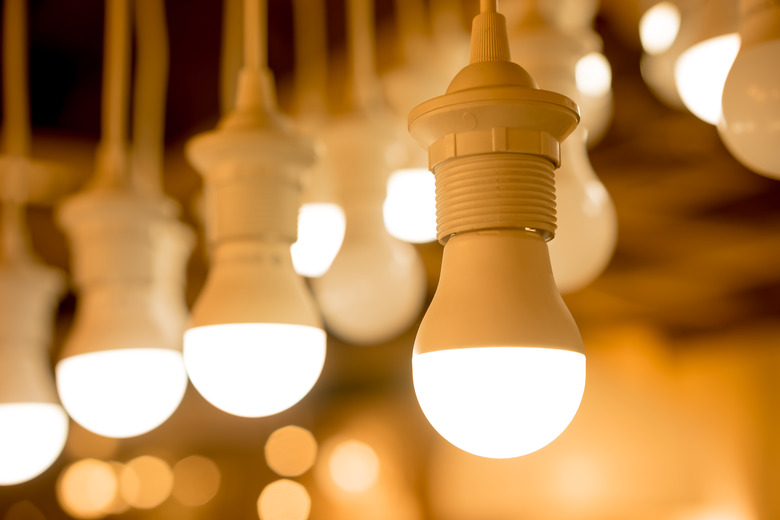How Are Diodes Used In Our Everyday Lives?
A diode is a two-terminal electronic component that conducts electricity in only one direction, and only when a certain minimum potential difference, or voltage, is applied to its two terminals. Early diodes were used to convert AC to DC and to filter out the signal in radios. Diodes have since become ubiquitous, used to protect electronics, light our homes and send remote-control signals.
The Basic Structure
The Basic Structure
To understand the basis of a diode's use, it helps to look at a standard diode's structure. The standard p-n diode has two semiconductors that make contact, forming an interface. Pure semiconductors don't conduct, so metal impurities are added. In one semiconductor of the p-n diode, the contaminant metal gives up an electron easily; the other is likewise doped (impurified) with a metal that accepts an electron easily. At the interface, electrons move from one side to the other, making the atoms that the electrons left positively charged and the receiving atoms negative. This deviation from neutrality happens only at the interface. It creates an electric field so that electrons flowing in from an outside current mostly go from the electron-accepting side to the electron-donating side.
Early Diodes: Radios
Early Diodes: Radios
This unidirectional property was first exploited in AM radios. The radio signal oscillates back and forth, creating an alternating current in the antenna. Before amplification, the signal must be made unidirectional. A radio's diode therefore lets through the half of the signal moving the electrons in one direction, but not the other half. In short, the AC is turned into DC. Capacitors then filter out the high frequency, leaving only the audio signal, ready for amplification.
LED
LED
If you apply a voltage across a diode, electrons from the electrical current moving around the electrical circuit will emit a specific wavelength of light when attaching to the impurity that accepts an electron. This is how light-emitting diodes (LEDs) produce light. The electrons then move across the semiconductor interface because of the electric field in between, cross the semiconductor that donates electrons, and continue on to the back end of the voltage source to complete the circuit.
Photodiodes and Light-Sensitive Diodes
Photodiodes and Light-Sensitive Diodes
Just as diodes can produce light, they can also create current when they receive it. The two types work together in a remote-control device, for example, for your television. The latter is how photovoltaic panels work. Two diodes emit light from your remote: One emits visible light to let you know the signal is being sent; the other emits a binary signal at an invisible wavelength (thus the need for the visible photodiode). The photons hit the electron-donating semiconductor, freeing electrons and giving them kinetic energy. The kinetic energy can translate in only one direction, since only one direction of electrical current is allowed. This is the same way that solar panels work, translating photons from the sun into electrical current in one direction only.
Circuit Protection
Circuit Protection
A diode can protect circuitry from improperly inserted batteries. The polarity will be incorrect, but it won't damage the circuitry past the diode, which allows only a faint current through. Diodes also play a role in surge protectors. So-called "avalanche" diodes lead to a ground wire, but they don't let regular current through because of their unidirectional orientation. At a high-enough voltage, a diode will let voltage through. When voltage surges far above operational levels, the avalanche diode opens up and lets the extra voltage out through the ground wire.
Cite This Article
MLA
johnmcgee, . "How Are Diodes Used In Our Everyday Lives?" sciencing.com, https://www.sciencing.com/diodes-used-everyday-lives-6388789/. 13 March 2018.
APA
johnmcgee, . (2018, March 13). How Are Diodes Used In Our Everyday Lives?. sciencing.com. Retrieved from https://www.sciencing.com/diodes-used-everyday-lives-6388789/
Chicago
johnmcgee, . How Are Diodes Used In Our Everyday Lives? last modified March 24, 2022. https://www.sciencing.com/diodes-used-everyday-lives-6388789/
